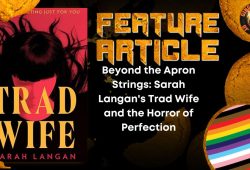Demon Song by Kelsea Yu, A Haunting Aria of Horror
Scheduled for release on September 30, 2025, by Titan Books, Demon Song marks Kelsea Yu’s highly anticipated follow-up to her Shirley Jackson Award-nominated novella Bound Feet. This gothic horror novella—clocking in at a taut 176 pages, transplants the Phantom of the Opera trope into the decaying grandeur of a Beijing opera house, weaving Chinese mythology and visceral body horror into a tale of trauma, ambition, and inherited secrets.

The narrative follows 16-year-old Megan Liu and her mother, Jia, who flee an abusive partner in Portland only to seek refuge in Beijing’s Huihuang Opera Theatre. In exchange for custodial work, they receive room and board within the ancient building, a setting immediately established as both sanctuary and prison. Yu masterfully layers Megan’s alienation: her rusty Mandarin and bi-cultural identity amplify her isolation until she meets Kristy, the theatre’s charismatic lead performing in an operatic adaptation of Journey to the West, specifically the saga of the White Bone Demon.
As Megan immerses herself in a battered copy of the Chinese classic and Kristy’s magnetic world, her suppressed passion for singing reignites. Yet the opera house’s physical decay mirrors its metaphysical rot. Hidden passages materialise; folklore bleeds into reality, and Jia’s evasiveness hints at a buried history with the theatre. The novella escalates when Megan realises the building’s “famished” sentience feeds on artistic desperation, tying her mother’s past to a decades-old mystery involving murder and supernatural bargains.
Yu’s genius lies in her dual exploration of tangible and spectral horrors such as
Kristy embodies the White Bone Demon’s seductive promise, offering fame and success at the steep price of losing bodily autonomy and personal freedom. Her chilling warnings about the theatre serve as a powerful metaphor, mirroring Yu’s sharp critique of how established institutions systematically exploit marginalised artists, with a particular focus on women who often bear the brunt of such exploitation. The opera house in the story takes this concept to a literal level, acting as a consuming force that devours the ambitions of its performers, effectively blurring the boundaries between demonic possession and the willing, yet costly, act of self-sacrifice.
Jia’s secrecy surrounding her connections to the theatre reflects deep cycles of intergenerational silence that have long been passed down. Their escape from abuse gradually transforms into a complex confrontation with the trauma inherited from previous generations, making the opera house stand as a powerful metaphor for unresolved histories and past wounds that seem to “hunger” for repeated reenactment and acknowledgement.
Megan’s ongoing struggle with language barriers and her search for a sense of belonging significantly amplify the horror she experiences. Her position as an outsider not only isolates her but also makes her increasingly vulnerable to the sinister manipulations of the building around her. This situation serves as a powerful reflection of the broader, more complex tensions that arise from diaspora identity and the challenges involved in cultural reconnection and acceptance.
Yu’s extensive background in short fiction truly shines through in her condensed yet richly detailed prose. Her descriptions of the opera house, with its “eerie passageways,” “phantasmagoric pitches,” and “decaying grandeur,” evoke the feeling of a living, breathing entity whose “hallways breathe” with an almost supernatural presence.
The way she integrates mythology into the narrative feels completely organic and natural, never forced or out of place; excerpts from Journey to the West seamlessly parallel Megan’s psychological unravelling. This all builds towards powerful set pieces where body horror emerges as a grotesque and vivid metaphor for the commodification of art, making the horror both deeply symbolic and viscerally impactful.
Demon Song is an extraordinary triumph of deeply atmospheric and emotionally charged storytelling. Yu’s masterful fusion of unsettling body horror, complex familial bonds, and rich cultural folklore firmly establishes her as a formidable and distinctive voice within the horror genre.
For readers who are in search of intelligent, thought-provoking, and emotionally resonant terror, this novella offers a haunting siren song that is utterly impossible to resist or forget.
Where to Find It
Pre-order tvia Titan Books, Amazon, Waterstones, or Audible (audiobook narrated by Spotify Studios). Releasing September 30, 2025
Demon Song by Kelsea Yu
A young woman discovers the terrifying secrets lurking within the walls of a Beijing opera house, in this addictive Gothic horror novella inspired by Chinese mythology about the price of fame, and the bonds between mothers and daughters. Perfect for fans of Shirley Jackson and Cassandra Khaw.
Places like this have a history. Desires. And this one is famished.
Megan and her mom are on the run after narrowly escaping the clutches of an abusive man who dragged them from Portland to Beijing. With few options, Megan’s mom turns to an old friend who offers them room and board in Huihuang Opera Theater in exchange for cleaning the ancient building.
Between her rusty Mandarin and constant reminders that she’s an outsider, Megan struggles with loneliness—until she meets Kristy, the glamorous young lead in the operatic adaptation of “The Monkey King and the White Bone Demon”. Soon, Megan’s free time is split between reading a battered copy of the Chinese classic that inspired the opera and her budding new friendship; Kristy’s love of singing brings out Megan’s long-buried ambitions.
But the opera house has its secrets. There are passages within the walls that shouldn’t be there, and the more Megan delves into that old book, the more the myths begin to bleed into real life. As Megan finds it increasingly difficult to separate reality from folklore, she must uncover a decades-old mystery to discover the true, horrifying secret of the opera house before it casts its hungry eyes on her.
Further Reading
For fans of horror literature, The Ginger Nuts of Horror website is an essential destination that should not be overlooked. This platform offers a dedicated horror book review section that caters specifically to the needs of horror enthusiasts. With its unique blend of insightful critiques, expert recommendations, and a vibrant community, the site serves as a treasure trove for anyone seeking their next spine-chilling read.
One of the standout features of the horror book review section is its diversity. Readers can discover everything from classic horror novels to contemporary indie gems, ensuring that there’s something for everyone. Each review is thoughtfully penned, providing not just a summary but also a deep dive into the themes, writing style, and overall atmosphere of the works. This allows readers to gauge whether a particular book aligns with their preferences.
For those passionate about horror literature, checking out this section is a must!











